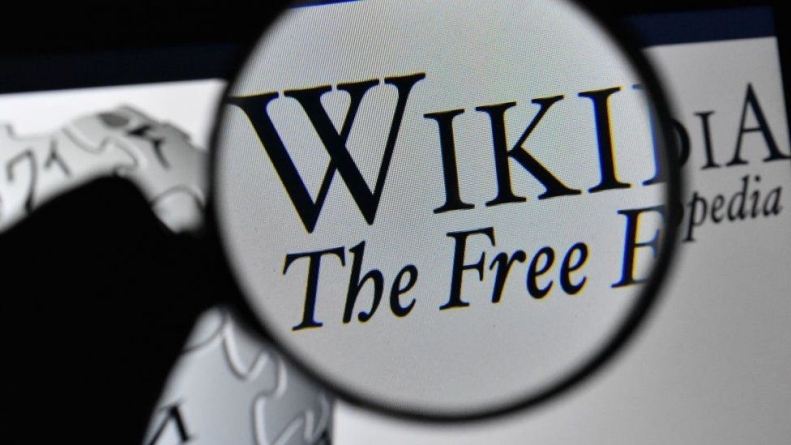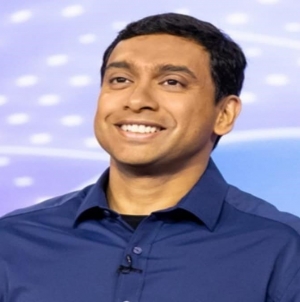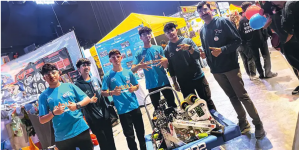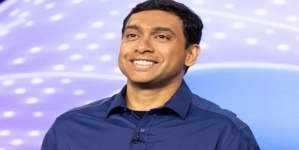-
LONDON: Indian-Origin Teen In UK Gets “Life-Changing” Cancer Treatment - 1 day ago
-
SILICON VALLEY: All About Pavan Davuluri, New Head Of Microsoft Windows - 1 day ago
-
LONDON: UK’s India Gate To Commemorate Role Of Indian Soldiers From World Wars - April 24, 2024
-
HARARE: Shri Bramha Kumar appointed as the next Ambassador of India to the Republic of Zimbabwe - April 23, 2024
-
LONDON: Indian-Origin Principal Wins UK Legal Challenge Over School Prayer Ban - April 23, 2024
-
TORONTO: Indian-Origin Doctor Needs ₹ 2 Crore For Legal Fees. Elon Musk Responds - April 22, 2024
-
KINSHASA: India-Democratic Republic of Congo Foreign Office Consultations - April 21, 2024
-
LONDON: UK Court Allows Sale Of Nirav Modi’s Luxury London Apartment - April 21, 2024
-
TEHRAN: Travel advisory for Iran and Israel - April 20, 2024
-
LUXEMBOURG: Shri Saurabh Kumar concurrently accredited as the next Ambassador of India to the Grand Duchy of Luxembourg - April 20, 2024
HONG KONG CITY:Tech Tent – what next for Wikipedia?
HONG KONG CITY: It’s the go-to site for information on just about everything but until recently Wikipedia has mostly avoided the battles over abusive behaviour and fake news that have plagued the social media giants.
Now, just
as a new chief executive takes over, a bitter dispute has erupted between
volunteer editors of the online encyclopedia’s Chinese language edition over
how events in Hong Kong are portrayed.
This
week’s Tech Tent asks whether Wikipedia can continue to prosper in the era of
misinformation.
The
dispute over Hong Kong centres on a key principle of Wikipedia, as Selina
Cheng, of the Hong Kong Free Press, explains to the programme: “Wikipedia
does not allow original reporting. So whoever wants to add or edit content on
Wikipedia articles has to cite existing sources, for example, government
releases or press reporting.”
But those
sources have to be designated as reliable – and here there was violent
disagreement between one group of volunteer editors who saw the Chinese
government as a reliable source and another, mainly based in Hong Kong, which
preferred to rely on the accounts of protesters.
Selina
Cheng says there was a lot at stake because some editors had access to
sensitive personal information which could be of interest to the Chinese
authorities: “There were fears that, because there was this increasing
tension among editors from these different geographical locations, some
administrators might abuse their access to use that personal information
against certain editors.”
This
week, the Wikimedia Foundation banned seven editors linked to a mainland China
group, which it accused of trying to advance the interests of the Chinese state
by infiltrating the encyclopedia.
The move
came as the foundation, which oversees the non-profit encyclopedia project,
announced the appointment of its new chief executive.
Maryana
Iskander, according to her Wikipedia entry, is an Egyptian-born American social
entrepreneur and lawyer who currently leads the Harambee Youth Employment
Accelerator in South Africa.
When we
asked her how she might approach challenges like the one in China, she was
careful to stress that the Wikipedia community is largely self-governing:
“One of the very early things that I’ve learned in this process is that
certainly the Wikimedia Foundation does not play a role in setting editorial
policy and that these are the debates that happen in communities.”
But she
said the foundation’s first job was to protect the safety of its volunteers and
the other key principle was transparency about how Wikipedia was run. She
pointed to the way Wikipedia had handled the 2020 US elections as an example of
its content being “transparent, verifiable and accurate”.
After
coming under fire for inaccuracy in its early years, it seemed that Wikipedia’s
self-correcting system where volunteers constantly monitored articles, and
discussed and implemented changes when new information arrived, could provide
an example for the less reliable social media platforms.
The
polarisation of debate and the determination of certain governments to see the
encyclopedia reflect their view of the truth have put the system under strain,
with increasingly bitter edit wars over entries on everything from climate
change to Donald Trump..
But
Maryana Iskander still believes in Wikipedians, as the volunteers like to call
themselves: “What’s been really interesting for me is to see how this is a
community of humans that are organising and getting interested in these exact
big debates, whether it’s women’s rights, whether it’s climate change.”
The
mission, she says, is to provide accurate and verifiable knowledge on some of
the most contentious questions of our time. Now let’s see whether in the era of
alternative facts that mission is still achievable.























